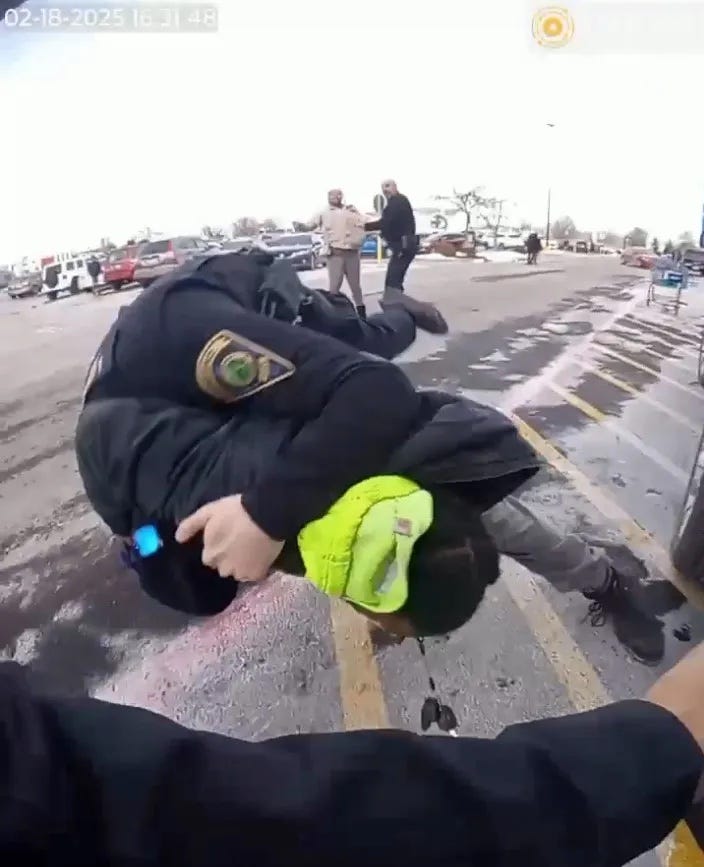The Nicholson Nugget: March 2025, issue 45
The Official Newsletter for the Law Office of Mark Nicholson
Welcome to Your March Nicholson Nugget
Hello!
Welcome to our latest edition of The Nicholson Nugget, where we keep you informed and inspired with all things legal. Whether you’re a valued client, a potential client, or one of our cherished public supporters, we’re thrilled to share our latest news with you!
In This Issue
We hope everyone had a great Black History Month, full of diversity, equity, and inclusion (DEI)! Now, we move into St. Patrick’s Day this month. The St. Patrick’s Day parade falls on the same day as Indiana Comic Con! We’re thrilled to share some highlights, updates, and the struggle for Police De-Escalation Training in this edition of our newsletter. Let’s get right to it!
It is truly an honor and privilege to be a parent, a mentor, or a friend. I wish everyone reading this has a positive impact on the people around them.
Office News & Achievements
🏢 Office Updates You Should Know About
Legal Victories
We’ve been busy at the office, delivering justice and resolving cases with excellent results. Here are a few highlights from recent weeks:
I had another criminal battery case dismissed.
I’m in the process of a settlement for my client, who was injured at a drugstore in Hamilton County.
We are interested in hiring an Associate Attorney. So, if you know someone looking, please have them contact our office at 317-219-3402.
My office will be at Comic-Con this Friday; we hope to see you!
A Nostalgic Return: From Paperboy to Contributor
I’m thrilled to announce that I’ve embarked on a new journey with The Courier-Times, the very paper that played a significant role in my youth. My first real job was as their paperboy. Now I’m a contributor! I am excited to offer movie reviews, restaurant reviews, legal tips, and whatever else they allow me to write. This opportunity allows me to engage with my hometown folks and relive and strengthen my cherished connection with the newspaper that shaped my early years.
Team Bonding, Popcorn, and Superheroes
If you’ve never gone to the movies with your coworkers, I recommend you do it at least once. Something about sitting in a darkened theater, surrounded by the sound effects of an epic battle and the crunching of buttery popcorn, builds connections in unexpected ways.
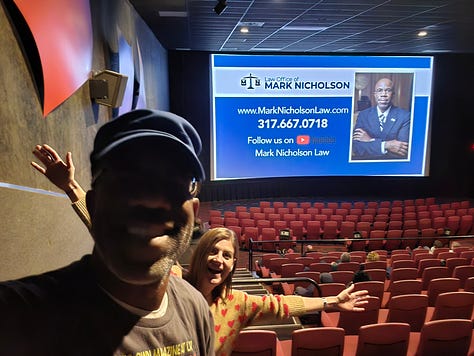
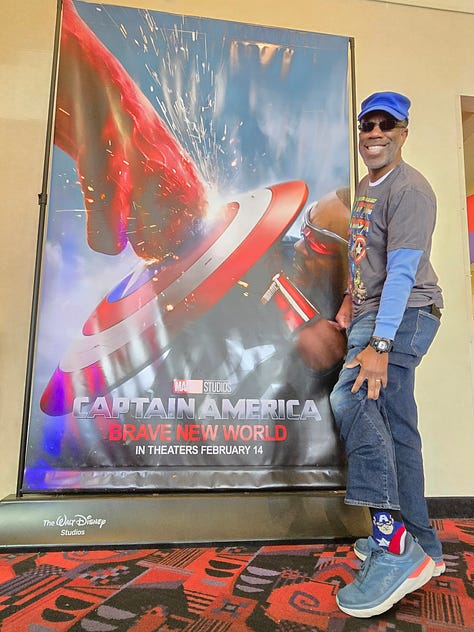

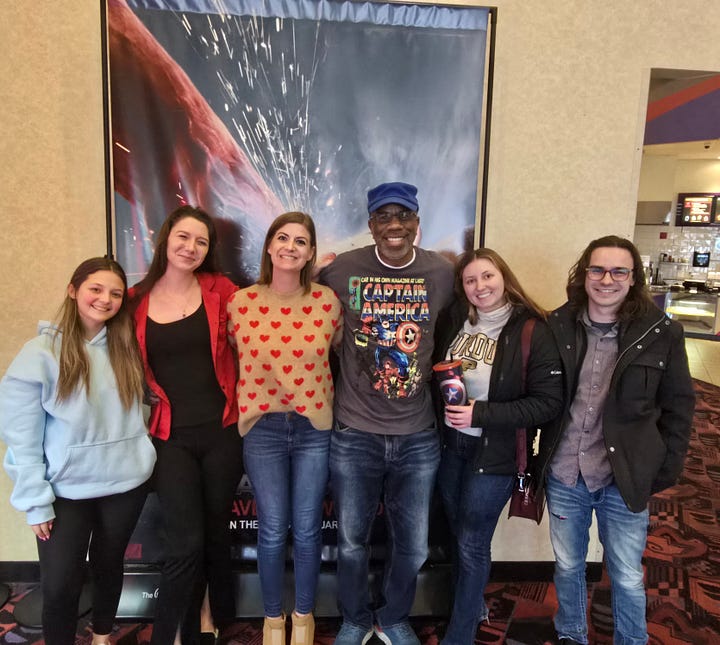
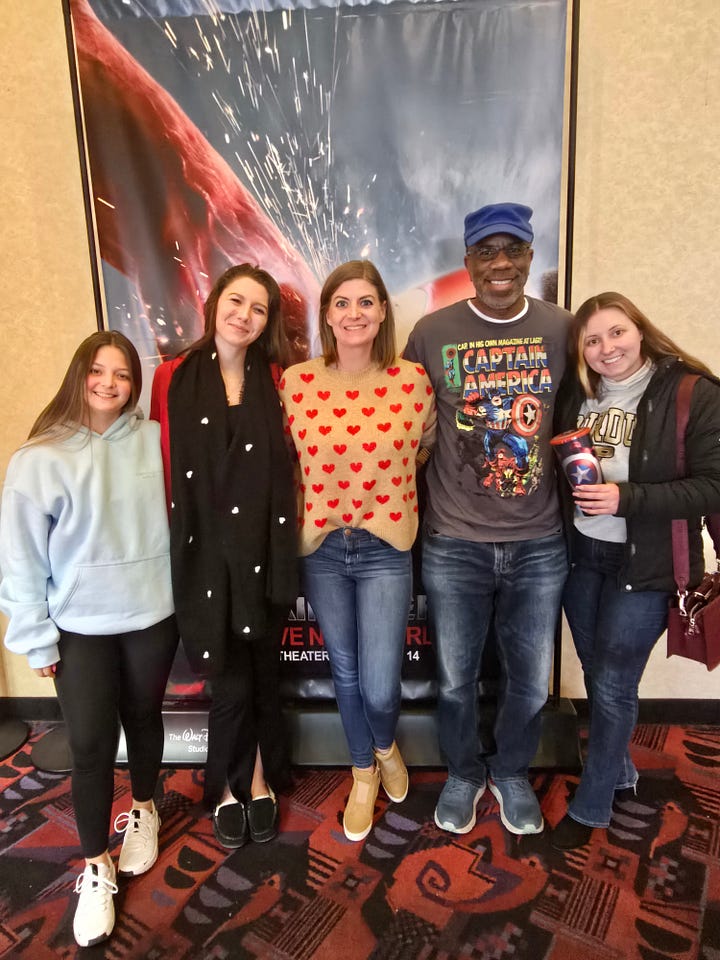
For my staff and me, the experience wasn’t just about the film. It gave us an opportunity to see each other in a new light, away from computer screens and deadlines. We could relax, share laughs, and swap thoughts about the unexpected plot twists and what moments moved us the most. There’s nothing like a shared cinematic experience to spark conversations and strengthen bonds.
The Nicholson Nugget of the Month
“Hustle until your haters start a fan club!"
By: ?
If/When/How IU McKinney Call Out and Panel
I was honored to be on a panel discussing reproductive rights. If/When/How IU McKinney is a student organization advocating for reproductive justice and abortion rights
The Battery Man Rap!
Please watch my new theme song, The Battey Man! It’s a rap song made exclusively for me.
De-Escalation Training Is a Non-Negotiable in Policing
The recent incident involving the Lawrence Police Department and William Jerome Armstrong has laid bare a troubling reality in our current system of policing. Bodycam footage and multiple firsthand accounts detail an unnecessary and entirely avoidable escalation that spiraled into violence. At its core lies a stark truth we cannot ignore—too many officers lack the de-escalation training necessary to safely and justly perform their duties.
This was not a high-stakes, life-or-death scenario. It began in a Walmart parking lot over a fire lane infraction, a minor issue that could have been resolved with nothing more than a citation or a polite request to move the vehicle. Instead, it became a spectacle of hostility, arrogance, and excessive force. And perhaps most damning, it was an entirely manufactured situation, escalated not by the individual but by an officer who instigated conflict rather than calming it.
The Pattern We Can’t Ignore
Instances like this raise pressing questions about how law enforcement is trained to interact with the public, especially with African-Americans and People of Color, who disproportionately face excessive force. According to a recent Harvard study, Black Americans are over three times more likely to be killed during a police encounter. This issue isn’t new, but cases like Armstrong’s remind us just how far we are from enacting meaningful reform.
De-escalation training is not a luxury or an optional extra in law enforcement; it is an absolute necessity. Had Officer Santiago been equipped with even basic de-escalation strategies, it’s likely that the altercation witnessed on that bodycam footage—and the trauma it caused Armstrong, his sister, and countless viewers—could have been entirely avoided.
How De-Escalation Works
De-escalation training focuses on equipping officers with tools to reduce tension in high-pressure situations. Techniques can be as simple as maintaining calm communication, creating physical space between themselves and the individual, and using body language that signals a willingness to resolve conflict peacefully.
The benefits of de-escalation training have been demonstrated time and again. Police departments implementing robust de-escalation programs have reported significant reductions in the use of force. A study by the Police Executive Research Forum (PERF) found that departments prioritizing de-escalation strategies saw a 23% drop in officer-involved shootings within just two years. Imagine the lives and futures that statistic represents—lives like Armstrong’s that would not have been uprooted by unnecessary violence.
Addressing the Counterarguments
Some might argue that police officers face unknown dangers, and they must act assertively to protect themselves and others. This concern is valid, but it does not excuse reckless or confrontational behavior. We’re not asking law enforcement to jeopardize their safety—we’re asking them to prioritize the safety of everyone involved. De-escalation does not make officers vulnerable. It equips them with better tools to assess and respond to threats in ways that minimize harm.
Others might say, “Why didn’t Armstrong comply?” This line of thinking shifts blame onto the victim without acknowledging the power imbalance or the provocations that preceded the response. Armstrong was not met with respect or professionalism; he was met with hostility and threats. When someone feels cornered or provoked, their instinct is often to defend themselves, an entirely human reaction that escalated this situation.
The Path Forward
This cannot continue. Every community deserves a police force that serves and protects without resorting to unnecessary violence. And when an officer does cross the line—as Santiago did—it’s the department’s responsibility to hold them accountable. But accountability alone is only half the battle. Prevention is key, and prevention starts with training.
It’s time for lawmakers, police leadership, and concerned citizens to mandate de-escalation training in every department. Programs that work already exist. For example, the Camden County Police Department in New Jersey successfully implemented de-escalation strategies in 2015 and saw use-of-force incidents plummet by more than 60%.
Law enforcement should not resemble a bad cop show. Officers aren’t “Billy badasses” on a mission to provoke and dominate. They are public servants, entrusted with the power to safeguard lives, not jeopardize them.
Call to Action
If you’ve been a victim of excessive police force, know that you’re not alone and that there are steps you can take to protect your rights. Call our office today for legal help. No one should have their life derailed by an unnecessary or unjust encounter with law enforcement.
And for everyone reading, the time to act is now. Contact your local representatives, demand mandatory de-escalation training, and hold police departments accountable when they fall short. Together, we can ensure that tragedies like this do not continue to define the relationship between law enforcement and communities.
The Lawrence police case was not an isolated incident. It was a symptom of a system that prioritizes authority over accountability. But it doesn’t have to be this way. Change is possible—if we demand it.
📣 We’d Love Your Feedback!
Enjoyed this update? Please like and share our newsletter with anyone who might find it interesting. Your support means the world to us, and we’d love to hear your thoughts!
Stay safe, stay informed, and stay inspired!
Thank you for being part of our community. Feel free to reach out with any inquiries or legal needs—we’re here to help.
Warm regards,
Mark Nicholson







